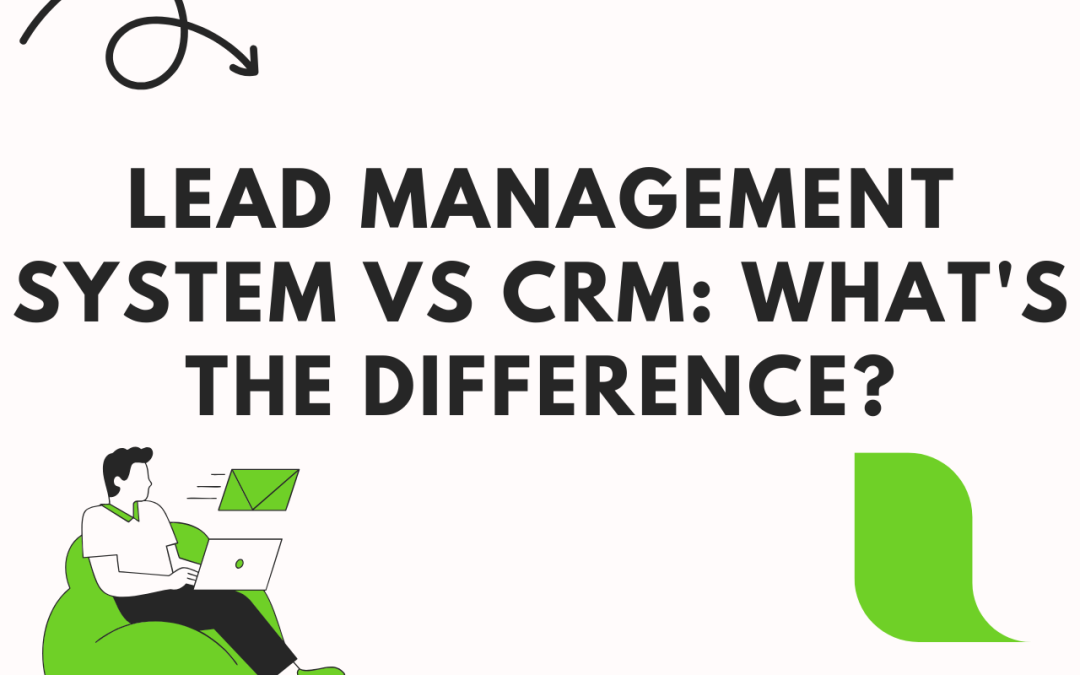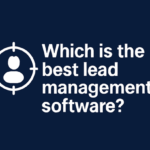A successful firm draws customers, streamlines operations, and increases profits. Businesses are increasingly using digital technologies to build client interactions. Lead management and CRM solutions commonly work together. Although two platforms that manage client data may appear comparable, their sales and marketing strategies sometimes differ greatly.
The two systems are thoroughly compared in this document. You’ll learn about these tools, see them in practice, and see how choosing the proper ones may change your sales approach. Lead management, essential for today’s businesses, was mentioned.
Lead management is crucial for enterprises. The goal is to track and manage leads through the sales process. It streamlines the sales process from initial contact to contract signing. Keeping sales teams at their best is the main goal.
Lead Management Systems help companies find, track, and convert prospects into customers. This method is beneficial early in a potential customer’s journey, when they’re still debating. The system handles everything from client communication to contract execution. It organizes potential customer management for enterprises.
The software gets data from numerous sources. Forms, emails, phone calls, social media, and advertising compete for a scarce resource. It matches prospects with the relevant individuals, evaluates their interest, and helps organizations cultivate those connections. Guide buyers through the buying process to increase sales.
Meaning of CRM?
CRM or Client Relationship Management systems let you manage your customers. Building relationships requires knowledge. Transaction history, choices, support sought, and other relevant facts are available. CRM systems are essential for many firms. These tactics help firms create relationships, customize communications, and satisfy customers.
Every sales process starts with lead management. Finalizing the agreement makes the CRM system shine. Different duties apply. The project has many tasks. These include communicating, helping, onboarding new clients, and building partnerships. CRM solutions are essential for firms that value client relationships.
Lead management and CRM solutions boost business success. In contrast, different groups achieve their aims in different ways. All sales begin with lead management. Once the best candidates are identified, details must be examined. This method uses specialized tactics to guide potential clients from initial contact to final purchase. CRM systems follow current and prospective customers, recording every encounter. Customer relationship management systems simplify complex customer service, marketing, and sales processes. The main goal is to build client loyalty through deeper relationships. The objectives of these methods differ. Lead management focuses on new business prospects. However, CRM focuses on client retention.
Both systems are connected yet have different goals.
Lead management solutions reach potential consumers before they buy. It powers marketing and sales, helping them find and close key deals. CRM solutions manage customer relationships. Such initiatives build team dedication. Consumer loyalty creates satisfied customers.
The first stage in managing is finding new leads. Customer relationship management is about retaining customers. Attracting clients? A race against time. CRM solutions are mostly used to build relationships and predict future events.
Lead management is growing. Changing circumstances require business adaptation. After getting leads, cultivating them is the hard part. Unpredictable market, erratic clients. Good lead management is really beneficial.
How businesses and customers interact has changed tremendously due to digital technologies. Lots of questions. They’re everywhere—websites, chat windows, social media feeds, even email. Without proper monitoring, many opportunities are missed.
A good lead management system attracts clients. This strategy clarifies roles and evaluates lead generation. Team results often improve with quick action. Lead management systems give organizations an advantage. They help organizations grow, streamline processes, and spot opportunities.
Lead management systems aim to accomplish numerous things.
Lead Management Systems provide a complete set of tools to ease lead management. It covers everything from initial contact to final transaction. It includes outreach, contract signing, and everything in between.
1. Get leads.
The system independently gathers leads from many sources. Without data entry, all recorded information is more reliable.
2. Monitor prospective clients.
Businesses track lead sources and evaluate results. Every motion is monitored. Email opens, clicks, and website visits are merely pieces. Keeping up with top marketing platforms requires constant vigilance.
3. Lead scoring.
A complete lead assessment must consider their goals, activities, and involvement. Teams focus on high-converting leads with this technique.
4. Assign Lead
This method instantly connects prospects with salespeople. This prevents misunderstandings by fostering accountability.
5. Getting new clients.
Automated lead nurturing guides prospects through the sales funnel. Emails, reminders, and any necessary follow-ups are included. Building trust and fostering engagement are crucial.
6. Lead Analytics
Businesses are learning to assess their operational efficiency. Determine why clients leave and evaluate marketing efforts. Strategic planning involves analyzing available data to inform decision-making.
CRM systems offer essential functions.
CRM systems are vital for firms seeking long-term customer relationships.
1. Any modern firm must manage client data.
A CRM system organizes a lot of client data into one place. Contact information, transaction history, user preferences, and help transcripts are included.
2. Monitoring communications.
Every interaction, whether a quick call, formal meeting, or casual chat, leaves a mark. This lets teams customize their messaging to overcome any challenges.
3. Many professional fields aim to boost efficiency.
CRMs are immensely adaptable. Their duties include mailing welcome letters and follow-ups. They update products and give account warnings. The client improved.
4. Customer Support Management
A CRM system streamlines support ticket management, speeding response times. Our clients get faster resolutions since we’re working faster.
5. Keeping Customers
Customer satisfaction builds long-term connections. Marketing, incentive programs, and communication strategies are tailored to the target audience.
Lead management and CRM systems are often confused, yet they serve different functions. These distinctions matter.
1. Could you clarify any things?
Lead management focuses on turning initial encounters into sales. CRM systems build and retain customer loyalty.
2. The sales process has begun.
Effective lead management is crucial in the early and mid-stages of sales. CRM systems are many salespeople’s ultimate desire. These aspects have relevance beyond the event being recounted.
3. User Teams
Effective lead management is crucial for sales and marketing. Customer support teams, salespeople, and account managers use CRMs.
4. Data Type
Successful lead management requires understanding potential clients’ behaviors and evaluation criteria. CRM systems log every client interaction.
5. The process.
Lead management systems encourage quick client reactions. CRM is about building relationships. This plan is long-term.
6. Reporting
Lead management reports reveal lead origins and paths to closure. CRM reports reveal a client’s value, likelihood of becoming a customer, and other indicators.
Why Lead Management and CRM Shouldn’t Be Confused
Lead management and CRM are often linked, but they serve different purposes. Lead management focuses on identifying, nurturing, and evaluating prospects before they buy. It helps teams understand interest levels and guide potential customers toward a purchase.
CRM goes further by managing the entire customer journey. It stores all interaction history, tracks communication, and supports long-term relationship building. While both systems share data, their goals differ. Lead management handles early-stage sales, while CRM manages customers from first contact to post-purchase.
Confusing the two can cause problems. Using CRM alone for leads creates gaps, lost opportunities, and weak follow-ups. Without a proper lead management system, teams lose focus and potential buyers slip away. Together, both tools strengthen sales, improve relationships, and support business growth.
Businesses must choose between an off-the-shelf tool and a tailored solution, possibly mixing aspects from other solutions. Customer support is offered from project planning to completion.
Lead management has many advantages.
1. Pipeline visibility improved
Lead management systems give teams a complete view of the process, regardless of where a lead is in the pipeline. Experts in this sector understand people well. They can handle numerous situations and execute well.
2. Accelerating.
When leads are distributed quickly, sales teams work better. Quick responses boost conversions greatly.
3. Better Leads
Scoring identifies promising leads. Teams might cultivate their best players.
4. Improve Team Performance
Automation lowers human labor. Salespeople close deals.
5. Financial prospects are improving.
Successful operations convert leads to customers.
6. Maintaining equilibrium.
Leads are never lost with automated reminders.
CRM solutions have many benefits.
1. Client happiness is key.
CRM systems use prior interactions to change communication.
2. Improved memory.
Strong client relationships require clear communication. Satisfied customers stick around.
3. Collaboration led to great advances.
Data flows seamlessly between departments. Promotes teamwork.
4. Better Choices
CRM reports help managers see customer behavior trends.
5. Numbers are improving.
Devoted audience? What a find. This group is more likely to invest and stay engaged.
Do two systems need to be maintained?
Both are crucial for most businesses. Lead management often determines customer acquisition. Creating and maintaining customer loyalty requires consumer connection management solutions. A good client experience is nearly guaranteed when these two factors work together. The organization benefits from a consistent flow of business from initial contact to final transaction.
Integrated systems improve accuracy, reduce errors, and advance. This simplifies your team’s processes, allowing them to swiftly identify potential clients and current patients. It also works seamlessly with your communication infrastructure.
Choosing the correct technology for your organization is important. This issue needs a full study. Something to contemplate.
Looking at what you have, what’s coming, and how you want to engage with customers is key to choosing the right path.
Most effective Lead Management Systems help with:
- What else?
- A good monitoring system boosts sales team performance.
- Obstacles are hindering pipeline progress.
- To be honest, I’m bad at follow-up.
Choosing a Customer Relationship Management (CRM) solution needs careful consideration of several important factors.
Improving customer service is crucial.
- A business needs repeat customers to thrive.
- A central database is necessary.
- Better teamwork is your goal.
- If that’s your goal, go for it.
- Improve your sales strategy.
- Lead and client management requires well-established workflows.
- We want to boost sales and build customer relationships.
- Sales teams use lead management systems, and it’s easy to see why.
Organized leads help sales teams succeed. Lead management systems simplify sales duties and provide transparency. Sharpening improves precision. People usually know what to do. This method promotes accountability and dependability.
Businesses often confront similar issues.
Many organizations still use spreadsheets or email to find client data. To be honest, it’s a mess. The decline in sales shows that our lead management and follow-up techniques aren’t working. Many firms believe CRM systems are the best lead management tool. Client growth usually complicates things.
Structured lead tools make conquering common obstacles easier. Operations can be automated to reduce human error.
Lead management evolves quickly.
Lead management is ever-changing. AI and automation are changing the world and won’t stop. Intelligent scoring, routing, and predictive analytics let you identify high-converting leads. Behavioral insights improve drug efficacy. Integrations streamline marketing-to-sales lead transfer.
Early adopters of these approaches will benefit. Businesses that handle leads quickly and accurately while knowing the details will succeed.
Conclusion
Lead management systems and CRMs save customer data for different objectives. Lead management involves guiding prospects through the buying process. CRM builds relationships beyond sales. A company’s success depends on both.
Businesses can see the entire customer experience by integrating these platforms. Managers streamline processes. Customer loyalty drives Customer Relationship Management; it keeps customers coming back. When these components work together, companies can advance and improve their products.














